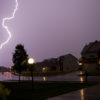Swimming is an enjoyable activity but is mostly done when the sun is still up. This, however, does not mean you should avoid it at night! For some people, nighttime swimming is a better option because they may not have a lot of free time during the day.
In truth, there are a few benefits if you swim at night, such as:
• Prevents sun exposure
• Promotes better sleep
• Ideal workout after having had a long day
• It is a good way to de-stress
If you are turning to swimming as a means of exercise, this workout can assist in the burning of carbs that you may have eaten during the day! If you plan on using your swimming pool at night, no matter the reason, it is only right to invest in quality lighting.
Pool owners should provide sufficient lighting all around the structure, as well as in it. Adding lights in this area has a few distinct advantages, such as adding visibility to the pool’s surroundings, in addition to creating an enjoyable ambiance. Plus, there are several popular choices these days to choose from that many homeowners find appealing.
What are the Top Pool Lighting Options?
There are several types of lightings to choose from that will fit your pool’s need. Owners can choose from solar lights, LEDs, and more. Here are the most popular selections that you can find today:
1. Traditional Incandescent Lights
This type of lighting is either made up of an incandescent bulb placed inside the pool wall. There is a sealed case that protects these lights. The incandescent lighting used to be the least expensive out of all the options and is the oldest technology in the pool industry for lighting your pool.
Pool owners opted for this type of lighting because it was inexpensive and at a time was the only option. You can compare them to the standard bulbs that were once used in many homes before the compact fluorescent lights (CFLs) and LED bulbs were introduced.
To produce light, a filament is heated, causing it to radiate. It is easy to distinguish incandescent lighting from other ones because the light has a yellow tint to it. They also have a seal, which is waterproof. Traditional lighting is often installed during the building process of the pool. It is tricky and sometimes risky to try and replace the bulb and seal of an older light. After five years it is best to replace the entire fixture versus trying to replace the bulb and seal. Failure to create a good seal can lead to electricity and water issues, and they do not mix too well!
2. Halogen Lights
The next advance in Pool lighting technology came in the form of Halogen Bulbs. These were considered an upgrade from the traditional form of lighting – incandescent lights. Halogen bulbs use about 20% less energy than incandescent bulbs, are brighter for better lighting throughout the pool, and have a longer lifespan. However, they have the same type of technology where a filament is heated, causing that yellow tint.
There is a distinct difference between the two where halogen bulbs have halogen gas within the bulb. This allows them to operate at a very high temperature, so be very careful around a halogen bulb. They are more expensive than incandescent lights but do last a bit longer.
3. LED Pool Lights
Modern LED fixtures have become the most popular option for pool lighting these days. They are more expensive than both halogen and incandescent bulbs, but they offer more features and benefits. LED lights are bright and can last for a very long time. Compared to incandescent bulbs that can only take about 5,000 hours, LEDs can light your pool up for as long as 25,000 hours or even more.
Another huge advantage is that LEDs are environmentally friendly in that they are very energy efficient. LED uses significantly less energy to create the same or better light output than either incandescent or halogen lights.
LED allows you to choose a lighting system that comes in different colors and brightness. The lights can even be programmed to have reflective qualities, or put on a show timed to your music or theme, their versatility and options are tremendous.
LED lighting can be used in the pool and in your landscape lighting.
4. Fiber-Optic Lights
Compared to LEDs, fiber optic lights do not give off intense brightness. Most pool owners have to use several of these lights to create an effect all over the pool. They are typically preferred by homeowners who want to create a starry look on the pool floor and are sometimes placed around the rim.
Using fiber optics is safe even in the water because the cables do not require electricity. Instead, they are attached to a box where light is generated through strands. Installation is easy, which is why many owners choose to do it themselves.
These systems are however very expensive and hard to maintain or replace. For this reason, most pool builders have gone away from fiber optic lighting.
5. Solar Lights- For the landscape, not the pool itself
This type of lighting uses a rechargeable battery and is connected to a solar collector that gathers solar energy. Compared to LEDs and other light options, solar does not produce bright lights. However, they are continually improving, which is why it is not surprising that they will provide better lighting in the future.
Solar lights are also available in different colors and sizes. You can even find options with a built-in sensor, which causes the lights to turn on automatically at night.
Lights are a part of pool landscaping that can either be flush mounted or surface mounted underwater. LEDs are often surface mounted because they are easy to install and can light up the whole pool. Additionally, they can be retrofitted in case you want to upgrade your current lights. Flush mounted lights are mounted inside the pool wall in a niche. However, they are costly to install in a retrofit since they are generally mounted during construction. If you are doing a pool remodel this would be the time to consider adding one of these fixtures if your pool does not have one now.
Pool Lighting Tips from Pool Troopers
Before you try to light up your pool, here are some recommendations from Pool Troopers:
• Put landscape lights far from where you or guests normally sit aimed away from seating areas. LEDs are pretty but they can produce intensely bright lights, which can hurt your eyes.
• Install two lights that face each other to highlight a plant or object as well as in your pool. If you only use a single light, it will create a shadow, which can easily highlight the flaws at the bottom of the pool (remember pool finish is hand troweled and will never be perfectly smooth). However, you can quickly hide those imperfections if you have two lights pointing at each other. The pairing can eliminate the shadows, so the result is a smooth floor.
• Give focus to a certain feature. You can create a silhouette that highlights the water features of your swimming pool. It can bring this space in your yard to life, which can make it all look exciting.
• Light up the surrounding area. The pool water is not the only place for you to install some lighting. You can use low-voltage lights, which save energy yet still softly brighten up your yard. It is an immediate effect that enhances this outdoor space. For instance, you can add lights that provide radiance along the pathways or even by the tree branches. They can all lead to the pool and garden, which will truly give a wonderful effect.
• Keep it simple, keep it safe. It is easy to get carried away when adding pool area lights. Start with an expandable landscape system and light up a few key features. You can expand if you like it and want to. Never put lights within 6 feet of the water’s edge and never string lights over any body of water.
• As much as possible, stick with LEDs because they offer bright radiance that none of the cheaper alternatives can provide.
• Stay safe. Always make sure that a licensed Pool Contractor or Electrician performs all work to your pool lighting. Accidents can happen anytime and anywhere, including your pool area. Make sure landscape lighting cords and cables will not trip anyone. Electrical hazards are a serious concern. Having a safety inspection from a licensed Pool Contractor or Electrician can eliminate some risk.
Contact Pool Troopers we can help with lighting or maintenance of your pool.



